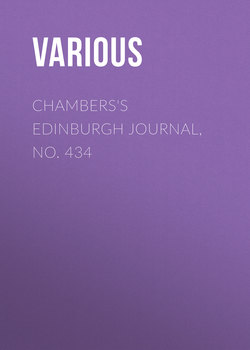Chambers's Edinburgh Journal, No. 434

Реклама. ООО «ЛитРес», ИНН: 7719571260.
Оглавление
Various. Chambers's Edinburgh Journal, No. 434
PUFF AND PUSH
RECOLLECTIONS OF A POLICE-OFFICER
THE VINCEJO'S PRIZE
PAINTERS' MONOGRAMS
CLARET AND OLIVES.1
THINGS TALKED OF IN LONDON
SONNET:
Отрывок из книги
The following narrative relates more to medical than to criminal history; but as the affair came in some degree under my notice as a public officer, I have thought it might not be altogether out of place in these slight outlines of police experience. Strange and unaccountable as it may at first appear, its general truth will hardly be questioned by those who have had opportunities of observing the fantastic delusions which haunt and dominate the human brain in certain phases of mental aberration.
On arriving in London, in 1831, I took lodgings at a Mr Renshawe's, in Mile-End Road, not far from the turnpike-gate. My inducement to do so, was partly the cheapness and neatness of the accommodation, partly that the landlord's maternal uncle, a Mr Oxley, was slightly known to me. Henry Renshawe I knew by reputation only, he having left Yorkshire ten or eleven years before, and even that knowledge was slight and vague. I had heard that a tragical event had cast a deep shadow over his after-life; that he had been for some months the inmate of a private lunatic asylum; and that some persons believed his brain had never thoroughly recovered its originally healthy action. In this opinion, both my wife and myself very soon concurred; and yet I am not sure that we could have given a satisfactory reason for such belief. He was, it is true, usually kind and gentle, even to the verge of simplicity, but his general mode of expressing himself and conducting business was quite coherent and sensible; although, in spite of his resigned cheerfulness of tone and manner, it was at times quite evident, that whatever the mental hurt he had received, it had left a rankling, perhaps remorseful, sting behind. A small, well-executed portrait in his sitting-room suggested a conjecture of the nature of the calamity which had befallen him. It was that of a fair, mild-eyed, very young woman, but of a pensive, almost mournful, cast of features, as if the coming event, briefly recorded in the lower right-hand corner of the painting, had already, during life and health, cast its projecting shadow over her. That brief record was this:—'Laura Hargreaves, born 1804; drowned 1821.' No direct allusion to the picture ever passed his lips, in my hearing, although, from being able to chat together of Yorkshire scenes and times, we speedily became excellent friends. Still, there were not wanting, from time to time, significant indications, though difficult to place in evidence, that the fire of insanity had not been wholly quenched, but still smouldered and glowed beneath the habit-hardened crust which concealed it from the careless or casual observer. Exciting circumstances, not very long after my arrival in the metropolis, unfortunately kindled those brief wild sparkles into a furious and consuming flame.
.....
'You have seen the original,' he went on with the same excited tone and gestures. 'It crossed me like a flash of lightning. Still, it is strange she does not know me. It is sure she does not! But I am changed, no doubt—sadly changed!' he added, dejectedly, as he looked in a mirror.
'Can you mean that I have seen Laura Hargreaves here?' I stammered, thoroughly bewildered. 'She who was drowned ten or eleven years ago?'
.....